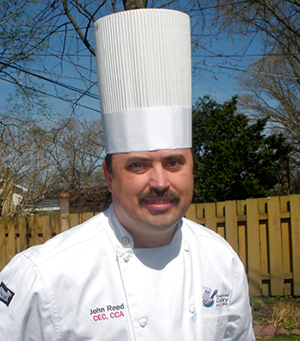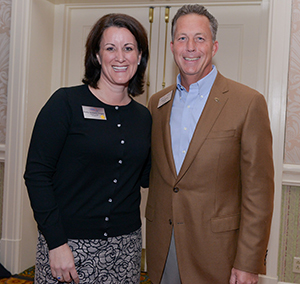The Culinary Institute of America Appoints VP of Strategy
 The Culinary Institute of America has appointed Rose S. Wang as the college’s vice president of strategy. Wang joined the college on Feb. 3, 2015, after serving as the chief financial officer of the Mount Sinai School of Medicine’s Center to Advance Palliative Care in New York City since 2013.
The Culinary Institute of America has appointed Rose S. Wang as the college’s vice president of strategy. Wang joined the college on Feb. 3, 2015, after serving as the chief financial officer of the Mount Sinai School of Medicine’s Center to Advance Palliative Care in New York City since 2013.
Before taking her position at Mount Sinai, she was managing director of Carat Companies, a Princeton, N.J.-based consulting firm to nonprofit organizations, and division CFO of beverages for the Campbell Soup Company in Camden, N.J. Prior to that she held several financial and strategic planning positions with Avon Products, Inc., and Citibank N.A., including executive director of business planning, director of international finance and operations, and director of finance and corporate development.

 The National Honey Board (NHB) has introduced a colorful, eye-catching, new, information-rich resource, A Guide to Honey Beverages. Serving as a complement to the Sweet Stirrings cocktail guide (2012), the honey beverage handbook features nearly 40 spiral-bound, laminated pages replete with honey tips, tricks and on-trend recipes to help operators enhance their non-alcoholic and alcoholic beverage menus and programs.
The National Honey Board (NHB) has introduced a colorful, eye-catching, new, information-rich resource, A Guide to Honey Beverages. Serving as a complement to the Sweet Stirrings cocktail guide (2012), the honey beverage handbook features nearly 40 spiral-bound, laminated pages replete with honey tips, tricks and on-trend recipes to help operators enhance their non-alcoholic and alcoholic beverage menus and programs. With the addition of Master of Wine Adam Lapierre (pictured) to the team and three brand new programs to the schedule, San Francisco Wine School now boasts top-level educators from, and coursework for, all four major wine credentialing bodies. The school’s elite group now comprises three Master Sommeliers (Court of Master Sommeliers), three with Diplomas in Wine & Spirits (Wine & Spirits Education Trust), three Certified Wine Educators (Society of Wine Educators) and one Master of Wine (Institute of Masters of Wine). This guarantees that, no matter which educational path wine students choose, they will be fully supported by San Francisco Wine School.
With the addition of Master of Wine Adam Lapierre (pictured) to the team and three brand new programs to the schedule, San Francisco Wine School now boasts top-level educators from, and coursework for, all four major wine credentialing bodies. The school’s elite group now comprises three Master Sommeliers (Court of Master Sommeliers), three with Diplomas in Wine & Spirits (Wine & Spirits Education Trust), three Certified Wine Educators (Society of Wine Educators) and one Master of Wine (Institute of Masters of Wine). This guarantees that, no matter which educational path wine students choose, they will be fully supported by San Francisco Wine School. Naturally, educators must stress to their students the critical importance of proper knife skills. But, says this chef-consultant, the reality in the workplace doesn’t always match what we teach. (Don’t miss the YouTube video link.)
Naturally, educators must stress to their students the critical importance of proper knife skills. But, says this chef-consultant, the reality in the workplace doesn’t always match what we teach. (Don’t miss the YouTube video link.) Emily Williams Knight—the newest of three educators on the NRAEF’s board—is committed to helping more Americans achieve meaningful, fulfilling careers in the restaurant industry via a respected national industry platform.
Emily Williams Knight—the newest of three educators on the NRAEF’s board—is committed to helping more Americans achieve meaningful, fulfilling careers in the restaurant industry via a respected national industry platform. Familiarity with cooking and incorporating lentils into various menu applications can help your students meet nutrition regulations, budgets and consumer demands when they become foodservice professionals.
Familiarity with cooking and incorporating lentils into various menu applications can help your students meet nutrition regulations, budgets and consumer demands when they become foodservice professionals. Many students are not used to conducing structured observations and might not know what to look for and how often to record behaviors. The more explicit you are about how they should conduct the observation, the more likely it will be an effective learning experience.
Many students are not used to conducing structured observations and might not know what to look for and how often to record behaviors. The more explicit you are about how they should conduct the observation, the more likely it will be an effective learning experience. On a recent trip to Hawaii, Chef Weiner had an epiphany: Teaching our students how to cook isn’t good enough. To better prepare them for the real world, we also need to introduce students to the different formats of serving. Here are 10 effective ideas that fit nicely within a shorter class timeframe.
On a recent trip to Hawaii, Chef Weiner had an epiphany: Teaching our students how to cook isn’t good enough. To better prepare them for the real world, we also need to introduce students to the different formats of serving. Here are 10 effective ideas that fit nicely within a shorter class timeframe.